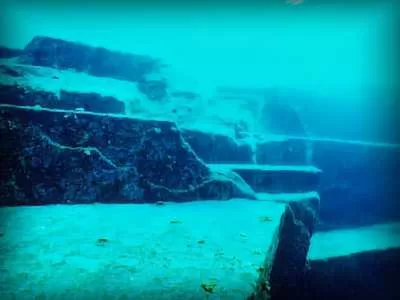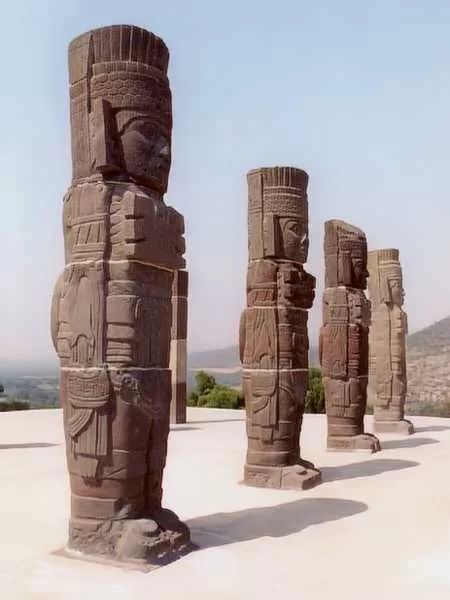The search for lost civilizations has taken an intriguing turn with recent discoveries off the coast of Cuba. Dr. Ray Brown’s 1970 claim of finding a pyramid “shining like a mirror” near the Bari Islands and the 2001 revelation of possible ruins by Canadian researchers have reignited speculation about ancient, sunken cities. Here’s a closer look at these enigmatic finds and their potential link to the fabled Atlantis.
Dr. Ray Brown’s Underwater Discovery
In 1970, Dr. Ray Brown, a diver exploring the waters near the Bari Islands in the Bahamas, reported an extraordinary discovery. According to Brown, he encountered a pyramid approximately 120 feet tall, although he could only see the top 90 feet. The pyramid was said to be topped with a colorful capstone and surrounded by the remnants of other structures. Inside one of these ruins, Brown claimed to have found a crystal held by metallic hands, with a brass rod and a red multifaceted gem suspended above it.
Brown’s account is both captivating and controversial. The pyramid’s dazzling description and the crystal’s purported mystical powers sound like something from a fictional narrative. Despite this, Brown’s tale continues to fuel imaginations, posing questions about what might lie hidden beneath the ocean’s depths.

The Cuban Underwater Ruins
Fast forward to May 2001, and another groundbreaking discovery emerged. A Canadian research team, led by Soviet-born ocean engineer Paulina Zelitsky, announced they had detected a sunken city off Cuba’s western coast. Utilizing advanced satellite-integrated ocean bottom positioning systems, echo sounders, and high-resolution side-scan sonar, Zelitsky’s team identified shapes resembling pyramids, roads, and buildings in approximately 2,200 feet (700 meters) of water.
Zelitsky, president of Advanced Digital Communications (ADC), described the find as an “urban development” featuring symmetrical architecture. The city lies on a submerged land plateau, near an extinct volcano and geological faults, suggesting that this area was once above sea level. According to Zelitsky, the site could date back to the pre-classic period of Central American history, similar to the early Teotihuacán culture of Yucatán.
The discovery has stirred excitement, but Zelitsky remains cautious. She emphasizes the need for further investigation, including planned joint research with the Cuban Academy of Sciences and the National Geographic Society.
The Significance of the Discovery
The implications of Zelitsky’s discovery are profound. The site’s symmetrical architecture and regularity challenge natural explanations and suggest human construction. The deep-sea city’s potential connection to the legendary Atlantis adds another layer of intrigue. Plato’s account of Atlantis describes a grand civilization that met its end due to catastrophic natural events. If the Cuban ruins are indeed linked to Atlantis, they could reshape our understanding of ancient history and pre-Columbian civilizations.

The Search for Sunken Treasures
ADC’s exploration was initially aimed at locating lost treasure from sunken ships rather than ancient cities. Cuba’s waters are known for their rich maritime history, with numerous shipwrecks from the era of conquest. The Cuban government, recognizing its lack of deep-ocean expertise, has partnered with ADC to leverage their advanced technology for underwater surveys.
In addition to potential ancient ruins, ADC and other treasure hunters have focused on recovering lost bullion and artifacts. The Toronto-based company Visa Gold, for example, has already retrieved thousands of items from sunken vessels, including jewelry and pistols.
Revisiting Historical and Geographical Theories
The Cuban discovery adds a new dimension to the debate about Atlantis. Some theories suggest that the island described by Plato might be Cuba, based on the alignment of geographic and cultural details. The discovery of a sunken city with advanced architecture could align with Plato’s description of Atlantis, which was reportedly submerged due to natural disasters around 9,000 BC.
The timing of the sea level rise at the end of the last Ice Age corresponds with Plato’s account of Atlantis’ destruction. The rising sea levels would have submerged low-lying regions, potentially including the site off Cuba’s coast. However, the city’s depth of 600-700 meters poses questions about its submergence timeline and the geological mechanisms behind it.
Future Exploration and Implications
The discovery has sparked renewed interest in the history and prehistory of the Caribbean. If the underwater structures off Cuba’s coast are indeed remnants of an ancient civilization, they could provide crucial insights into the region’s past. Upcoming investigations, including the use of remote-operated vehicles and submersibles, are expected to reveal more about these intriguing findings.
In the broader context, the potential link to Atlantis could have significant implications for historical scholarship. If the Cuban ruins are proven to be a lost city of great antiquity, it may prompt a reevaluation of ancient myths and their connections to real-world locations.
Conclusion
Dr. Ray Brown’s early claim and the recent findings by Paulina Zelitsky’s team offer tantalizing glimpses into the depths of history. Whether or not the Cuban ruins prove to be Atlantis, they undoubtedly contribute to the ongoing fascination with lost civilizations and their mysteries. As further research unfolds, the quest to uncover the truth behind these submerged ruins will continue to captivate and inspire.

